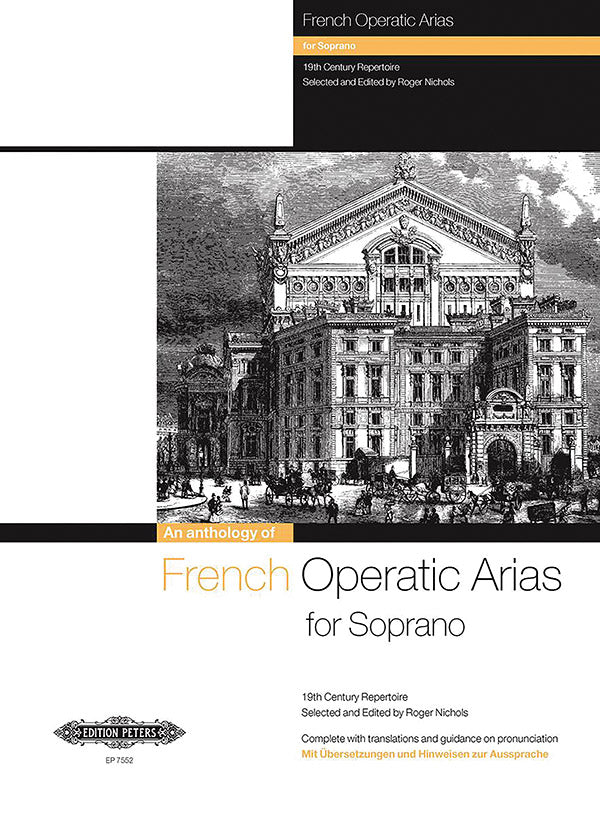French Operatic Arias for Soprano
19th Century Repertoire
In stock and typically ships within 1 business day.
- Composers: Ambroise Thomas (1811-1896), Hector Berlioz (1803-1869), Giuseppe Verdi (1813-1901), Giacomo Meyerbeer (1791-1864), Gioachino Rossini (1792-1862), Georges Bizet (1838-1875), Charles Gounod (1818-1893), Léo Delibes (1836-1891), Édouard Lalo (1823-1892), Jules Massenet (1842-1912), Jacques Offenbach (1819-1880), Daniel Auber (1782-1871)
- Editor: Roger Nichols
- Instrumentation (this edition): Piano Reduction, Soprano
- Originally for: Opera
- Work Language: French
- ISMN:
- Size: 9.0 x 12.0 inches
Description
Complete with translations and guidance on pronunciation. 'As every singer and lover of French opera knows, editions of even the best-known French operatic arias are difficult – and sometimes expensive – to obtain. Roger Nichols' scrupulously balanced selection of 19th-century French arias provides the perfect starting point for widerexploration. Nichols, who has championed French music in his writings, talks and radiobroadcasts over three decades with eloquence and scholarship, is the ideal guide to this repertoire which, even today, is often neglected, misunderstood or inadequately performed.
- Auber:Quel bonheur, je respire (Fra Diavolo)
- Berlioz:Entre l'amour (Benvenuto Cellini)
- Bizet:Comme autrefois (Les pêcheurs de perles)
- Delibes: Où va la jeune Indoue (Lakmé)
- Gounod: Ah! Je ris de me voir (Faust)
- Gounod: Il était un roi (Faust)
- Gounod : Ô légère hirondelle (Mireille)
- Gounod: Je veux vivre (Roméo et Juliette)
- Lalo:Lorsque je t'ai vu (Le roi d'Ys)
- Massenet: Pleurez, mes yeux! (Le Cid)
- Massenet: Obéissons (Manon)
- Massenet: Adieu, notre petite table (Manon)
- Massenet: Dis-moi que je suis belle (Thaïs)
- Meyerbeer:Parmi les pleurs (Les Huguenots)
- Offenbach: Les oiseaux dans la charmille (Les contes d'Hoffmann)
- Offenbach: Elle a fui (Les contes d'Hoffmann)
- Rossini: Sombre forêt (Guillaume Tell)
- Thomas: Je suis Titania (Mignon)
- Verdi: Toi qui sus le néant (Don Carlos)
Works:
- Quel bonheur, je respire from Auber: Fra Diavolo
- Parmi les pleurs from Meyerbeer: Les Huguenots
- Sombre forêt from Rossini: Guillaume Tell (William Tell)
- Entre l'amour from Berlioz: Benvenuto Cellini, H 76, Op. 23
- Je suis Titania from A. Thomas: Mignon
- Toi qui sus le néant from Verdi: Don Carlos
- Il était un roi from Gounod: Faust, CG 4
- Ah! Je ris de me voir from Gounod: Faust, CG 4
- Ô légère hirondelle from Gounod: Mireille
- Je veux vivre from Gounod: Roméo et Juliette, CG 9
- Les oiseaux dans la charmille from Offenbach: Les contes d'Hoffmann (The Tales of Hoffmann)
- Elle a fui from Offenbach: Les contes d'Hoffmann (The Tales of Hoffmann)
- Lorsque je t'ai vu from Lalo: Le roi d'Ys
- Où va la jeune Indoue from Delibes: Lakmé
- Comme autrefois from Bizet: Les Pêcheurs de perles (The Pearl Fishers)
- Adieu, notre petite table from Massenet: Manon
- Obéissons from Massenet: Manon
- Pleurez, me yeux! from Massenet: Le Cid
- Dis-moi que je suis belle from Massenet: Thaïs, DO 24
Publishers use a lot of words to describe what they sell, and we know it can be confusing. We've tried to be as clear as possible to make sure you get exactly what you are looking for. Below are descriptions of the terms that we use to describe the various formats that music often comes in.
Choral Score
A score for vocalists that only contains the vocal lines. The instrumental parts are not there for reference. Generally, cheaper than a vocal score and requires multiple copies for purchase.
Facsimile
Reproductions of the original hand-written scores from the composer.
Full Score
For ensemble music, this indicates that the edition contains all parts on a single system (there are not separate parts for each player). In larger ensembles, this is for the conductor.
Hardcover
Hardbound. Generally either linen-covered or half-leather.
Orchestral Parts
Similar to a wind set, this is a collection of parts. In the case of strings, the numbers listed are the number of copies included, though generally these are available individually (often with minimum quantities required).
Paperback
When publishers offer multiple bindings (e.g. hardcover) or study scores, this is the "standard" version. If you're planning to play the music, this is probably what you want.
Performance / Playing Score
A score of the music containing all parts on one system, intended for players to share. There are not separate parts for each player.
Set of Parts
For ensemble music, this indicates that there are separate individual parts for each player.
Solo Part with Piano Reduction
For solo pieces with orchestra, this is a version that contains a piano reduction of the orchestra parts. For piano pieces, two copies are typically needed for performance.
Study Score
A small (think choral size) copy of the complete score meant for studying, and not playing. They make great add-ons when learning concertos and small chamber works.
Vocal Score
A score prepared for vocalists that includes the piano/organ part or a reduction of the instrumental parts.
Wind Set
For orchestral music, this is a collection of wind and percussion parts. The specific quantities of each instrument are notated.
With Audio
In addition to the printed music, the edition contains recordings of the pieces. This may be an included CD, or access to files on the internet.
With / Without Fingering (Markings)
Some publishers prepare two copies - a pure Urtext edition that includes no fingering (or bowing) suggestions and a lightly edited version that includes a minimal number of editorial markings.


